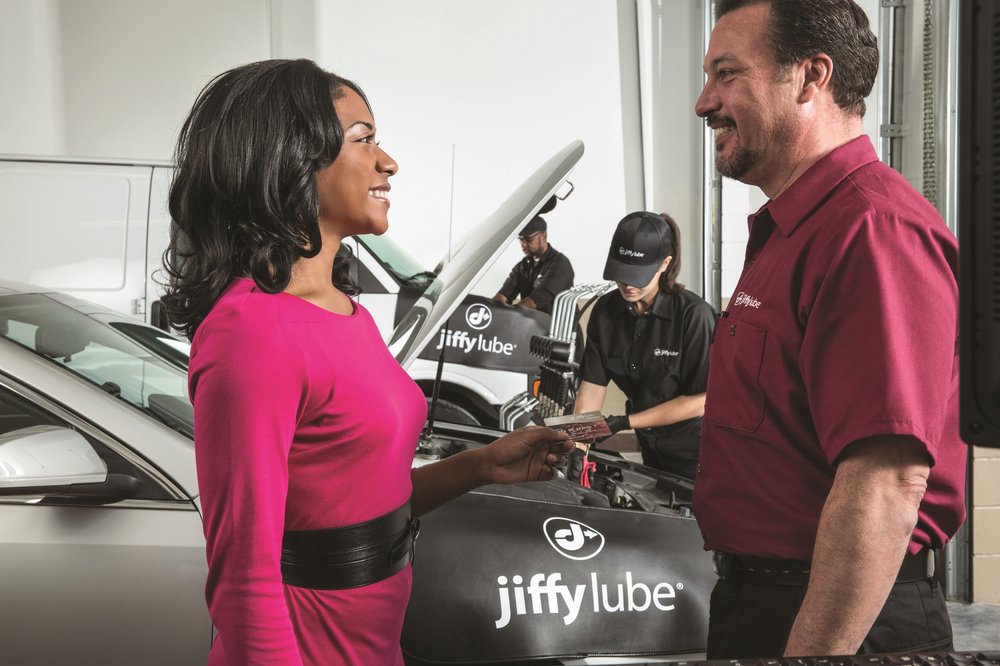Car Maintenance Tips
Learn what you can do at home to help maintain your vehicle’s longevity and value in between your visits to Jiffy Lube®. Click Here to visit our Jiffy Lube Resource Center
Scroll through this page to read and learn about some of our most essential tips for improving your fuel economy and maintaining your vehicle.
Understanding how your vehicle works is one of the first steps in maintaining its value and longevity. Just as quality service is key to a healthy vehicle, so is education. Take a fun trip through the Jiffy Lube® How Cars Work, an interactive tool to learn about your car and its parts in.
 Fuel Efficiency Review
Fuel Efficiency Review
Want to improve gas mileage? Come in for our Fuel Efficiency Review. It’s free with a Jiffy Lube Signature Service® Oil Change and can help improve your gas mileage by 1-10% per gallon. *Save up to 55 cents per gallon, based on $3.72/gallon
As part of your Jiffy Lube Signature Service® Oil Change, we will evaluate the following items free of charge that help improve fuel economy:
- Tire Pressure Check
- Inspect condition of engine air filter
- Usage of the proper grade of motor oil
Gas Saving Tips
Here are some gas saving tips that can help you get the most out of every gallon of gas you buy:
Drive Sensibly – Aggressive driving (speeding, rapid acceleration and braking) wastes gas. It can lower your gas mileage by 33 percent at highway speeds and by 5 percent around town. Sensible driving is also safer for you and others, so you may save more than gas money.
Observe the Speed Limit – While each vehicle reaches its optimal fuel economy at a different speed (or range of speeds), gas mileage usually decreases rapidly at speeds above 60 mph. As a rule of thumb, you can assume that each 5 mph you drive over 60 mph is like paying an additional $0.20 per gallon for gas. Observing the speed limit is also safer.
Remove Excess Weight – Avoid keeping unnecessary items in your vehicle, especially heavy ones. An extra 100 pounds in your vehicle could reduce your MPG by up to 2%. The reduction is based on the percentage of extra weight relative to the vehicle’s weight and affects smaller vehicles more than larger ones.
Avoid Excessive Idling – Idling gets 0 miles per gallon. Cars with larger engines typically waste more gas at idle than do cars with smaller engines.
Use Cruise Control – Using cruise control on the highway helps you maintain a constant speed and, in most cases, will save gas.
Use Overdrive Gears – When you use overdrive gearing, your car’s engine speed goes down. This saves gas and reduces engine wear.
Keep Your Engine Properly Tuned – Fixing a car that is noticeably out of tune or has failed an emissions test can improve its gas mileage by an average of 4 percent, though results vary based on the kind of repair and how well it is done. Fixing a serious maintenance problem, such as a faulty oxygen sensor, can improve your mileage by as much as 40 percent.
Check & Replace Air Filters Regularly – Replacing a clogged air filter can improve your car’s gas mileage by as much as 10 percent. Your car’s air filter keeps impurities from damaging the inside of your engine. Not only will replacing a dirty air filter save gas, it will protect your engine.
Keep Tires Properly Inflated – You can improve your gas mileage by around 3.3 percent by keeping your tires inflated to the proper pressure. Under-inflated tires can lower gas mileage by 0.4 percent for every 1 psi drop in pressure of all four tires. Properly inflated tires are safer and last longer.
Use the Recommended Grade of Motor Oil – You can improve your gas mileage by 1-2 percent by using the manufacturer’s recommended grade of motor oil. For example, using 10W-30 motor oil in an engine designed to use 5W-30 can lower your gas mileage by 1-2 percent. Using 5W-30 in an engine designed for 5W-20 can lower your gas mileage by 1-1.5 percent. Also, look for motor oil that says “Energy Conserving” on the API performance symbol to be sure it contains friction-reducing additives.
** Source: The Department of Energy. For more information, visit their website at www.fueleconomy.gov
A Breath of Fresh Air for Your Vehicle
Your vehicle has engine air filter looks like a simple barrier of accordion-like folded paper because that is all it is. However, it is responsible for providing clean air to your engine’s cylinders. …
A Second Life for Your Used Motor Oil
Have you ever wondered what happens to your old dirty motor oil after you receive a Jiffy Lube Signature Service® Oil Change? Jiffy Lube is proud to recycle oil so it doesn’t go to waste or harm the environment …
Back-to-School Carpool Tips
For many parents, back-to-school time means carpools. Before hauling the kids around town, parents need to make sure their vehicles are operating in tip-top shape. These quick tips will help ensure your …
Detecting Trouble Digitally
It’s nice to know that sometimes technology truly is there to make things easier rather than the other way around. Such is the case with the On-Board Diagnostic (often shortened to OBD) system …
Drive a “Green” Machine
More and more of us are trying to reduce their impact on the environment by recycling plastics and paper, choosing efficient appliances and adjusting the thermostat to save energy. But what about …
Improve Fuel Efficiency
People are constantly looking for ways to get the best gas mileage possible for their vehicle. Jiffy Lube® is here to help you learn how to get more miles per gallon on the road so you can stretch …









